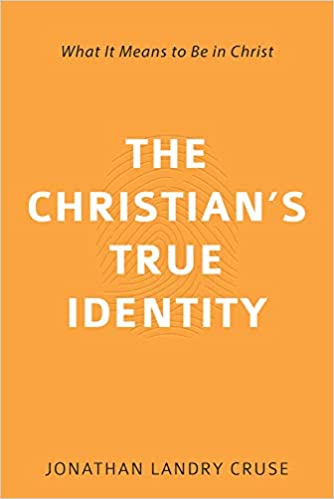
Jonathan Landry Cruse
Reviewed by: James T. Lim
The Christian’s True Identity: What It Means to Be in Christ, by Jonathan Landry Cruse. Reformation Heritage, 2019. Paperback, 155 pages, $11.00. Reviewed by OP pastor James T. Lim.
In our therapeutic, self-help, identity-obsessed culture, one of the most important questions people ask themselves is, “Who am I?” It’s a question that reveals people’s search for meaning and significance. According to Cruse, the answer to this question “ultimately…reveals what we believe is our identity” (2).
In this little gem of a book, Cruse takes us through the Christian’s true identity “in Christ” and how it makes an “eternal difference” in our lives (15). He walks the reader through various passages that highlight aspects of our union with Christ and how it impacts our self-identity exegetically, doctrinally, historically, culturally, apologetically, and most important of all, experientially.
He begins with our union with Christ (ch. 1), and then proceeds to walk us through what it means to be chosen (ch. 2), pardoned (ch. 3), righteous (ch. 4), adopted (ch. 5), one (ch. 6), new (ch. 7), secure (ch. 8), alive (ch. 9), and in communion with Christ (ch. 10). He teaches what each of these words means for our identity in Christ. He highlights the various “false identity gospels” that pervade our culture and society and then proceeds to show how our true identity—our deepest and most satisfying identity—is and ought to be “in Christ.”
What I appreciated most was Cruse’s engagement with the competing cultural and social identities that Christians can be prone to take up and his explanation of how these identities ultimately fall short in the end. And then he shows us how infinitely better and more satisfying our identity in union with Christ truly is and the ways in which it is a more secure, lasting, and life-giving one at that.
He provides an exposition of each aspect of our identity in Christ from Bible passages, while interacting with diverse sources ranging from Justice Kennedy’s majority opinion in Obergefell v. Hodges (4) to Rachael Denhollander’s address to Larry Nassar (43) to Søren Kierkegaard, John Calvin, Martin Luther, John Owen, and the Reformed catechisms and confessions, just to name a few.
Cruse has written a unique book that, though relatively short, packs an enormous amount of profound, yet accessible, biblical truth that informs the intellect, warms the heart, and encourages us to worship and live for Jesus. As a collection of edited sermons, the book provides a model of what Reformed preaching ought to look like. As a doctrinal exposition on union with Christ, it is married to our Christian experience, showing us its relevance for all of life. And as a book for twenty-first-century Christians, it reminds us that the gospel is timeless and can still answer the pressing contemporary questions of identity for believers and unbelievers alike. I heartily recommend this book for personal devotions, group studies (using the questions at the end of each chapter), and for use in counseling people with identity struggles.
My only criticisms are, first, that a final chapter, perhaps, on glorification in Christ might have been a fitting conclusion, and, second, as T. David Gordon writes in his endorsement, I was “saddened” to “arrive at the end of this pithy volume,” hoping there will be an expanded treatment in the future.
January 11, 2026
Texts that Transform: Church and Ministry
January 04, 2026
December 28, 2025
December 21, 2025
December 14, 2025
December 07, 2025
November 30, 2025
© 2026 The Orthodox Presbyterian Church